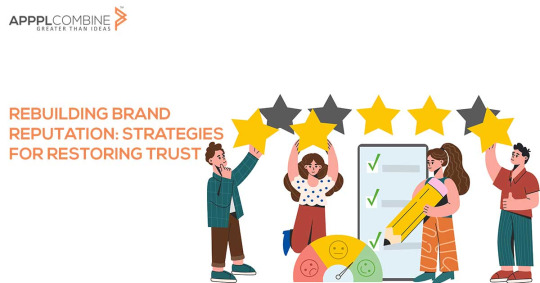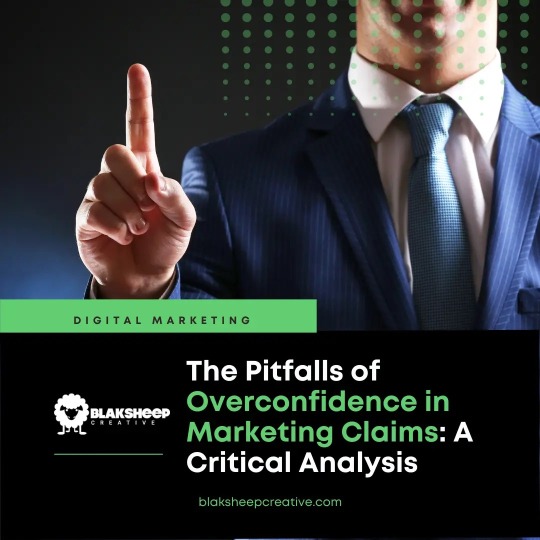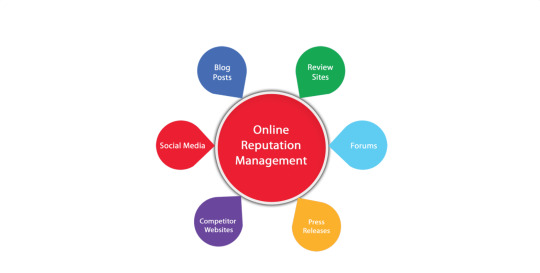#Brand Reputation Management
Explore tagged Tumblr posts
Text
Brand Reputation Management: How to Build and Maintain a Positive Brand Image

In the digital era, a brand's reputation is often its most valuable asset. The perception of your brand can influence customer trust, loyalty, and your overall market success. Effective Brand Reputation Management ensures your brand consistently conveys a positive image to the public. This blog delves into the importance of managing brand reputation and how Online Reputation Management Services can play a pivotal role in maintaining your business's credibility.
Why Is Brand Reputation Management Important?
Brand reputation management involves actively monitoring and influencing how your brand is perceived by customers, stakeholders, and the public. It's an ongoing effort to safeguard your brand from negative publicity and to promote positive feedback and customer engagement.
Can a Strong Reputation Influence Customer Decisions?
Yes, absolutely! A good reputation builds trust, making it easier for customers to choose your products or services over competitors. In fact, most consumers make purchasing decisions based on the opinions they find online.
What Are Online Reputation Management Services?
Online Reputation Management Services (ORM) encompass strategies and tools designed to monitor and improve your brand's online presence. These services focus on ensuring your brand maintains a favorable impression in digital spaces, such as social media platforms, review sites, and search engines.
How Do ORM Services Work?
Monitoring Mentions: They track conversations and mentions of your brand online.
Managing Reviews: ORM providers respond to reviews, both positive and negative, in a professional manner.
Promoting Positive Content: Through SEO and content marketing, they help push positive narratives about your brand.
What Steps Can You Take to Manage Your Brand Reputation?
Even without outsourcing to ORM experts, businesses can adopt proactive steps to maintain a strong reputation.
1. Regularly Monitor Your Online Presence
Set up alerts for mentions of your brand name. Tools like Google Alerts or social media monitoring apps can help.
2. Respond to Feedback
Engage with your audience by addressing their comments and concerns. Whether it's a positive review or a criticism, timely responses show that you care.
3. Encourage Customer Reviews
Satisfied customers can be your best advocates. Encourage them to leave reviews, which can outweigh occasional negative feedback.
4. Share Valuable Content
Content marketing helps establish your brand as an authority in your industry, building credibility and trust.
How Can Online Reputation Management Services Benefit Your Business?
While managing your reputation in-house is possible, professional services often offer advanced tools and expertise to amplify your efforts.
Are ORM Services Worth It?
ORM providers not only save you time but also bring expertise in mitigating potential risks. They ensure negative content doesn’t overshadow your brand’s positive aspects, helping you maintain a strong online presence.
Key Benefits Include:
Improved visibility of positive content.
Reduced impact of negative publicity.
Enhanced engagement with your target audience.
What Challenges Come with Reputation Management?
Can You Prevent All Negative Feedback?
No, negative feedback is inevitable. However, how you respond to it can make all the difference. Prompt, empathetic responses often turn dissatisfied customers into loyal advocates.
How Do You Handle Fake Reviews?
Fake reviews can be damaging. Professional ORM services can identify and flag fake reviews while amplifying authentic positive feedback.
Conclusion
Effective brand reputation management is crucial for long-term success in today's competitive landscape. Whether you choose to handle it in-house or hire professionals, maintaining a positive brand image ensures customer trust and loyalty. By leveraging Online Reputation Management Services, you can proactively safeguard your business from negative impacts while promoting a trustworthy and credible brand identity.
Invest in your brand’s reputation today—it’s an investment in your future success!
1 note
·
View note
Text
Reputation Management Solutions for Business Growth
Repute Matters offers comprehensive reputation management solutions that help businesses protect, manage, and enhance their online image. Our expertise ensures that your brand is portrayed in the best possible light across all digital platforms, from social media to review sites and search engines.
Effective reputation management goes beyond just removing negative content; it involves actively promoting positive reviews, managing customer interactions, and addressing any potential issues before they escalate. At Repute Matters, we use advanced tools and strategies to monitor your brand’s online presence, ensuring that any negative comments or reviews are swiftly addressed and resolved. By doing so, we help businesses mitigate the risks associated with a damaged reputation and turn challenges into growth opportunities.
Our reputation management solutions are designed to foster long-term relationships with customers, improve online trust, and enhance brand visibility. Whether you're a small business or a large corporation, Repute Matters offers tailored solutions that align with your goals and objectives, ensuring that your reputation is always a strong asset.
#Reputation Management Solutions#Brand Reputation Management#Digital Reputation Management#Reputation Management for Businesses#Reputation Monitoring Tools#Repute Matters Reputation Services
0 notes
Text
Brands Are Now Vetting Influencers' Past Before Collaborations: A New Era of Digital Due Diligence
In the fast-paced world of digital marketing, influencers have become a crucial part of brand promotion. Their reach, engagement, and personal branding can drive massive consumer interest. However, with increasing scrutiny on past online behavior, brands are now running background checks on influencers before associating with them. This preventive measure ensures companies avoid unnecessary controversies that can damage their reputation.

#influencer background checks#influencer vetting#brand collaboration#digital due diligence#AI influencer screening#social media audits#influencer marketing risks#brand reputation management
0 notes
Text
How Social Media Impacts Online Reputation Management

Your brand’s online presence is shaped by social media engagement. ORM ensures that you project a positive image on Facebook, Instagram, LinkedIn, and Twitter.
🔹 Social Media ORM Tips: ✔ Post valuable content consistently ✔ Engage with your audience authentically ✔ Address customer complaints professionally ✔ Monitor brand mentions & hashtags
Learn to manage your brand’s social presence effectively: Logicwelltechnologies.com
#ORM#ReputationManagement#DigitalMarketing#OnlineBranding#ORM experts#brand trust repair#online reputation solutions#online brand management#online reputation repair#online reputation management agency#brand reputation management#social media branding services
0 notes
Text
Online Reputation Management for Dental SEO Marketing Growth
What is Online Reputation Management? Online reputation management (ORM) involves monitoring, influencing, and controlling how a brand or individual is perceived online. This process includes managing reviews, responding to feedback, and actively promoting positive content. ORM strategies often involve SEO techniques to ensure that favorable information ranks higher in search results, overshadowing any negative content. For businesses, particularly dental practices, ORM helps build trust with potential patients by showcasing a positive and reliable online presence. In essence, ORM aims to create a favorable image that can drive better engagement and attract more clients.

Why Online Reputation Management is Important for Websites? Online reputation management is crucial for websites because it directly impacts how users perceive a brand. A positive online reputation can lead to increased trust, higher engagement, and more conversions. For dental practices, managing reputation online ensures that potential patients see a trustworthy and professional image. Effective ORM can prevent negative reviews from tarnishing a practice’s reputation and help maintain a strong, credible online presence. This proactive approach also aids in improving search engine rankings and enhances overall brand credibility.
What Benefits You Get by Online Reputation Management? Online reputation management provides several benefits, including enhanced brand credibility and increased customer trust. By effectively managing online reviews and responses, businesses can improve their public perception and attract more customers. For dental clinics, ORM ensures that positive patient experiences are highlighted, potentially driving more appointments. Additionally, ORM can mitigate the impact of negative reviews and misinformation, allowing businesses to maintain a favorable image. Overall, the benefits of ORM include improved online visibility, better customer relations, and increased business growth.
Read more: https://rxdentalmarketing.com/services/dental-online-reputation-management/
#online reputation management#dental seo marketing#brand reputation management#online reputation management seo#online reputation seo#Online appointment scheduling for dental clinics#Top dental marketing services in Norway#Dental clinic marketing in Oslo#Dental marketing services#Dental branding strategies#Increasing online presence for dental clinics#SEO services for dental practices#Dental SEO
0 notes
Text
Unethical Behavior in Digital Marketing: A Closer Look
Because the information stream is so rapid in the current environment, unethical behavior are especially important for digital marketing organizations. Unfortunately, the allure of quick wins and short-term gains can sometimes lead to unethical practices that can have severe consequences for brands and their reputations. Common Unethical Behaviors in Digital Marketing Misleading…
#brand and reputation management#Brand Reputation#brand reputation management#brutal honesty#digital marketing company#ethics and integrity#Marketing Scandals#unethical behavior#unethical behavior in the workplace#unethical behaviour examples#unethical in business#unethical practices
0 notes
Text
Rebuilding Brand Reputation: Strategies for Restoring Trust

In this blog post, we will explore effective strategies for rebuilding brand reputation and restoring trust after facing a crisis.
Understanding the Impact of Brand Reputation
When a brand faces a crisis, its reputation can be significantly impacted. A negative brand reputation can lead to decreased customer trust, loss of business, and damage to the brand's overall image. It is crucial to understand the impact of brand reputation in order to effectively navigate a crisis and rebuild trust.
One key aspect of understanding the impact of brand reputation is recognizing that customers often form opinions based on their perception of the brand. If a brand is associated with negative experiences or values, customers are likely to have a negative view of the brand. On the other hand, a positive brand reputation can result in increased customer loyalty and advocacy.
Furthermore, brand reputation can also affect the perception of a brand's products or services. Customers may be hesitant to purchase from a brand with a damaged reputation, even if the specific product or service is of high quality. Understanding these dynamics is essential for formulating effective strategies for rebuilding brand reputation.
Identifying the Root Causes of Brand Damage
To effectively rebuild brand reputation, it is important to identify the root causes of the brand damage. This involves conducting a thorough analysis of the crisis and understanding the factors that contributed to the negative perception of the brand.
One possible root cause could be a specific incident or event that directly impacted the brand's reputation. This could include a product recall, a publicized customer complaint, or a scandal involving the brand or its employees. Identifying these incidents and understanding their impact is crucial for developing strategies to address them.
In addition to specific incidents, it is also important to consider any underlying issues or weaknesses within the brand's operations or culture that may have contributed to the crisis. This could include issues such as poor customer service, unethical business practices, or a lack of transparency. By addressing these root causes, brands can not only rebuild their reputation but also prevent similar crises from occurring in the future.
Implementing Crisis Communication Strategies
Effective crisis communication is essential for rebuilding brand reputation. It is important to develop a comprehensive communication strategy that addresses the concerns and expectations of stakeholders, including customers, employees, and the general public.
One key aspect of crisis communication is transparency. Brands should be open and honest about the crisis, acknowledging any mistakes or shortcomings. This can help rebuild trust and demonstrate a commitment to addressing the issues at hand.
Another important element of crisis communication is timeliness. Brands should communicate regularly and promptly, providing updates on the actions being taken to address the crisis. This can help manage expectations and ensure stakeholders are informed.
Furthermore, it is important to tailor the communication strategy to different stakeholders. For example, customers may require different information and reassurances compared to employees or investors. Understanding the needs of each stakeholder group and crafting targeted messages can enhance the effectiveness of the communication strategy.
Leveraging Social Media for Reputation Recovery
Social media can be a powerful tool for rebuilding brand reputation. It provides brands with a platform to directly engage with their audience, address concerns, and showcase their efforts to rectify the crisis.
One strategy for leveraging social media is to proactively communicate with customers. Brands can use social media channels to provide regular updates, respond to customer inquiries, and address any misconceptions or negative comments. By actively engaging with customers, brands can demonstrate their commitment to rebuilding trust and transparency.
Additionally, brands can leverage social media to showcase their efforts to rectify the crisis. This could include sharing stories of how the brand has taken corrective actions, highlighting employee testimonials, or showcasing community involvement. By sharing these positive aspects, brands can rebuild their reputation and regain customer trust.
It is important to monitor social media channels closely and respond promptly to any negative or misleading information. By addressing concerns and correcting misinformation in a timely manner, brands can prevent further damage to their reputation.
Measuring Success: Monitoring and Evaluating Brand Reputation
Measuring the success of reputation recovery efforts is crucial to ensure the effectiveness of strategies and make necessary adjustments. Monitoring and evaluating brand reputation allows brands to track progress, identify areas of improvement, and make data-driven decisions.
One way to measure success is through customer feedback and sentiment analysis. Brands can collect feedback from customers through surveys, online reviews, and social media mentions. Analyzing this feedback can provide insights into how customers perceive the brand and whether there has been a positive shift in sentiment.
In addition to customer feedback, brands can also monitor key performance indicators (KPIs) related to reputation, such as customer retention rates, brand mentions in the media, and social media engagement. By tracking these metrics over time, brands can assess the impact of their reputation recovery efforts.
It is important to regularly evaluate and adjust strategies based on the data and insights gathered. This iterative approach allows brands to continuously improve their reputation management efforts and effectively rebuild trust.
Apppl Combine unleashes in managing brand crises through strategic reputation management. We offer expertise in crisis communication, swiftly addressing issues to mitigate negative impacts on the brand's image. We as an online reputation management agency develop comprehensive crisis plans, including monitoring online sentiment, crafting timely responses, and engaging with stakeholders to maintain transparency and trust. Utilizing various channels such as social media, press releases, and direct communication to control the narrative and restore confidence in the brand. Additionally, we provide post-crisis analysis to identify weaknesses and refine strategies for future crisis management, ensuring resilience and safeguarding the brand's reputation.Explore effective strategies for rebuilding brand reputation and restoring trust after facing a crisis. Understand the impact of brand reputation, identify root causes, and implement crisis communication strategies
This post was originally published on: Apppl Combine
#brand reputation#rebuilding trust#crisis communication#Brand Damage#Social Media Recovery#reputation management#Online Reputation Management#Brand Reputation Management#Customer Feedback#Brand Crisis#Apppl Combine#Crisis Management
0 notes
Text
How important is online reputation management for small businesses and startups?
Importance of Online Reputation Management for Small Businesses and Startups:
Here is how online reputation management is important for small businesses and startups:
1. Builds Trust and Credibility: A positive online reputation helps establish trust with potential customers and partners.
2. Improves Visibility and Search Rankings: Effective ORM can boost a business's visibility in search engine results.
3. Manages Negative Feedback: ORM allows businesses to address and mitigate the impact of negative reviews or comments.
4. Enhances Brand Image: ORM helps startups cultivate a strong, consistent brand image online.
5. Attracts Investors and Customers: A positive online reputation can make a business more attractive to investors and customers.
Remember - “In the online reputation management industry, the customer experience reigns supreme. Brands need to ensure that from the very first touchpoint through product or service delivery, customer needs and expectations are met” – Search Engine Journal
Online Reputation Management Tasks:

Here's related information that you may also find helpful – Brand Reputation Risk
0 notes
Text
Brand reputation management services
With our expert online brand reputation management services, we at Reputation Champions systematically safeguard the reputation of your business. Our method for establishing a brand’s reputation guarantees that your company’s integrity and quality are upheld by your internet presence.
0 notes
Text
#brand reputation management#brand reputation#customer perception#brand strategy#digital marketing#social listening#online reviews#brand identity#customer engagement#pr agency#pr agency in noida#best pr agency in india#best pr agencies in india#pr agency for startups in india#best pr agencies in noida#pr#pr agencies in noida#public relations
0 notes
Link
As consumers become increasingly discerning and vocal about their experiences, businesses must prioritize their brand image to foster trust and loyalty. A reputable brand reputation management agency can help businesses bolster their online presence and brand perception.
#Brand Reputation Management Agency#Brand Reputation Management#Reputation Management Agency#strong brand reputation#Building and maintaining
1 note
·
View note
Text
Top Crisis Management Tips for Small Businesses
One of the first steps in crisis management is to act quickly and transparently. A swift response shows your customers that your business takes accountability seriously and is ready to resolve the issue. Whether responding to negative feedback on social media or addressing a larger crisis, timely communication is key to maintaining trust. Repute Matters helps businesses formulate clear, empathetic responses that reassure customers and stakeholders, showing that their concerns are being taken seriously.
Another crucial tip for small businesses is to have a crisis management plan in place before a crisis occurs. Planning for potential issues—whether it’s product recalls, employee-related crises, or PR disasters—ensures your team is prepared to act with confidence. Repute Matters assists businesses in creating a tailored crisis management strategy that includes pre-drafted responses, internal communication guidelines, and recovery steps. This proactive approach helps businesses stay calm under pressure and navigate crises more effectively.
In addition to addressing immediate issues, businesses should focus on rebuilding trust after the crisis has passed. Repute Matters emphasizes the importance of ongoing communication with your audience, explaining what steps have been taken to prevent similar issues from happening again.
#Crisis Management Tips#Brand Reputation Management#Crisis Management for Small Businesses#Crisis Prevention in Business#Online Reputation Crisis
0 notes
Photo


🔥 Ooohhhweee, this one might sting! 🐝 Are your bold marketing claims really hitting the mark, or are they just missing the bullseye? 🎯 We're unpacking the pitfalls of claiming to be the "Nation's #1" when it might not resonate with your local crowd. Dive into our latest piece where we reveal the true power of authentic and targeted marketing strategies. 🎩✨ Don't get caught in the overconfidence trap - read on to make sure your brand stands out for all the right reasons! #MarketingTips #SEOStrategy #LocalSEO #BrandGrowth 👉 https://blaksheepcreative.com/digital-marketing/overconfidence-in-marketing-claims/
#Digital Marketing Strategy#Authentic Branding#Marketing Claims Analysis#Consumer Trust#SEO Best Practices#Transparent Marketing#Competitive Landscape#Local SEO Tactics#Marketing Authenticity#Brand Reputation Management#Marketing Regulations#Unique Selling Propositions#Customer Engagement#Overconfidence in Marketing#Marketing Communication
0 notes
Text
The Role of Social Media in Shaping Your Online Reputation

Social media plays a crucial role in shaping how your brand is perceived online. Regularly engaging with your audience, sharing valuable content, and addressing concerns promptly can enhance your reputation. However, negative comments or viral posts can quickly damage your image. By leveraging ORM strategies, you can monitor social media activity, respond to feedback, and maintain a positive presence. Whether you’re a small business or a large corporation, prioritizing social media reputation management is essential for long-term success.
#ORM#ReputationManagement#DigitalMarketing#OnlineBranding#ORM experts#brand trust repair#online reputation solutions#online brand management#online reputation repair#online reputation management agency#brand reputation management#social media branding services
0 notes
Text
Online Reputation Management for Dental SEO Marketing Growth
What is Online Reputation Management? Online reputation management (ORM) involves monitoring, influencing, and controlling how a brand or individual is perceived online. This process includes managing reviews, responding to feedback, and actively promoting positive content. ORM strategies often involve SEO techniques to ensure that favorable information ranks higher in search results, overshadowing any negative content. For businesses, particularly dental practices, ORM helps build trust with potential patients by showcasing a positive and reliable online presence. In essence, ORM aims to create a favorable image that can drive better engagement and attract more clients.

Why Online Reputation Management is Important for Websites? Online reputation management is crucial for websites because it directly impacts how users perceive a brand. A positive online reputation can lead to increased trust, higher engagement, and more conversions. For dental practices, managing reputation online ensures that potential patients see a trustworthy and professional image. Effective ORM can prevent negative reviews from tarnishing a practice’s reputation and help maintain a strong, credible online presence. This proactive approach also aids in improving search engine rankings and enhances overall brand credibility.
What Benefits You Get by Online Reputation Management? Online reputation management provides several benefits, including enhanced brand credibility and increased customer trust. By effectively managing online reviews and responses, businesses can improve their public perception and attract more customers. For dental clinics, ORM ensures that positive patient experiences are highlighted, potentially driving more appointments. Additionally, ORM can mitigate the impact of negative reviews and misinformation, allowing businesses to maintain a favorable image. Overall, the benefits of ORM include improved online visibility, better customer relations, and increased business growth.
Read more: https://rxdentalmarketing.com/services/dental-online-reputation-management/
#online reputation management#dental seo marketing#brand reputation management#online reputation management seo#online reputation seo#Dental marketing services#Dental branding strategies#Increasing online presence for dental clinics
0 notes
Text
Why Online Reputation Management (ORM) is Crucial for Your Business Success
In today’s competitive digital landscape, businesses can no longer afford to ignore the importance of SEO (Search Engine Optimization) and ORM (Online Reputation Management). These two vital services can make or break your brand’s online success. Whether you're a small business in Mumbai, a startup in California, or a growing enterprise in New York or New Zealand, mastering SEO and maintaining a strong online reputation are essential for attracting new customers and maintaining a loyal following.
In this post, we’ll explore the significance of SEO and ORM, how they can benefit your business, and why expert services are a must for sustained growth. If you're ready to take your business to the next level, keep reading to learn how SEO and ORM can work together to drive organic traffic, improve search engine rankings, and protect your brand from negative online perceptions.
What is SEO? And Why Does Your Business Need It?
Search Engine Optimization (SEO) is the practice of optimizing your website to rank higher in search engine results like Google, Bing, and Yahoo. SEO aims to increase your website’s visibility and drive organic traffic, ensuring that your website appears on the first page of search results for relevant keywords.
The importance of SEO cannot be overstated. Studies show that the majority of users rarely look past the first page of Google search results. If your business isn’t ranking on the first page, you’re losing valuable opportunities to attract potential customers. Let’s break down how SEO can benefit your business:
1. Increased Visibility and Traffic
When your website ranks higher on search engines, it’s more likely to be found by your target audience. SEO services help you optimize your website and content so that you appear in the top search results for keywords your potential customers are searching for.
For example, if you offer SEO services in Mumbai or reputation management in New York, an effective SEO strategy will help you get discovered by businesses and individuals looking for your expertise. Increased visibility leads to more organic traffic, which in turn can lead to higher conversion rates.
2. Cost-Effective Marketing
Compared to traditional advertising, SEO is a cost-effective marketing strategy. While paid ads require continuous investment, once your SEO strategy is properly implemented, you can continue to reap the benefits without recurring costs. This makes SEO a long-term, high-return investment for your business.
3. Better User Experience
Google prioritizes websites that offer a positive user experience. This includes fast-loading pages, mobile-friendly designs, easy navigation, and valuable content. A well-optimized website with a seamless user experience not only ranks higher but also encourages visitors to stay longer, reducing your bounce rate and improving conversions.
4. Local SEO for Targeted Traffic
For businesses in specific locations, local SEO is crucial. If you operate in a city like New York or Mumbai, your website should be optimized to rank for location-based searches. Local SEO ensures that when someone searches for services near them (like "SEO services near me" or "best ORM services in New York"), your business appears in the search results.
What is ORM (Online Reputation Management)?
In today’s digital world, reputation is everything. A single negative review or misleading article can significantly harm your brand’s image. This is where Online Reputation Management (ORM) comes in. ORM services help businesses manage and improve their online presence by addressing negative content and promoting positive reviews, articles, and feedback.
Here’s why ORM is critical for your business:
1. Building Trust with Your Audience
Your online reputation influences potential customers’ decision-making process. Positive reviews and testimonials instill confidence in your brand, while negative content can drive customers away. By proactively managing your reputation, you can build trust with both current and prospective clients.
2. Protecting Your Brand
Negative content, such as bad reviews, complaints, or scams, can quickly go viral. ORM services help you monitor your brand’s online presence and respond to negative feedback. They also help bury harmful content and promote positive content, ensuring that your brand image remains intact.
For businesses operating in highly competitive markets like New York or California, protecting your reputation is key to staying ahead of your competitors.
3. Improving Search Engine Results
When you implement ORM strategies, you not only improve your brand’s reputation but also influence your SEO performance. By creating and promoting positive content, such as blog posts, press releases, and testimonials, you can outperform negative content and improve your rankings.
4. Managing Crisis Situations
In case of a PR crisis or any other negative incident, ORM services can help you handle the situation with professionalism and care. Effective ORM strategies ensure that negative situations don’t spiral out of control, allowing you to maintain a good standing with your customers.
How SEO and ORM Work Together to Boost Your Business
SEO and ORM are two sides of the same coin. While SEO helps increase your website’s visibility and drive traffic, ORM ensures that the content people find about your brand is positive and trustworthy. Here's how these services work together to benefit your business:
1. Reputation Affects Rankings
Google’s algorithm considers online reputation when ranking websites. Businesses with a positive reputation are more likely to rank higher in search results. By improving your reputation through ORM, you not only protect your brand but also boost your SEO efforts.
2. SEO Drives Traffic to Positive Content
When you implement an effective ORM strategy, you create positive content that will rank on search engines. This content can drive traffic to your website, social media profiles, and other platforms where potential customers can learn more about your services.
3. Combining SEO with ORM for a Holistic Approach
A combination of SEO and ORM ensures that you attract traffic from both positive brand-related content and highly relevant keywords. Together, these strategies can help you dominate search results, drive more organic traffic, and build a strong online presence.
Why Choose Expert SEO and ORM Services?
While you can implement basic SEO strategies on your own, achieving long-term success requires a deep understanding of the ever-changing search engine algorithms and reputation management tactics. This is where expert services come in.
An experienced SEO consultant or ORM expert can:
Tailor strategies to your specific business needs.
Use advanced tools to track your rankings, performance, and reputation.
Analyze competitors to develop a more effective strategy.
Provide ongoing monitoring to adjust and optimize your SEO and ORM efforts.
Conclusion: Take Control of Your Online Presence Today
In conclusion, SEO and ORM are two indispensable services for any business looking to thrive in today’s digital world. Whether you’re located in Mumbai, New York, California, or New Zealand, expert SEO and ORM services can help you grow your business, improve your online reputation, and dominate search engine rankings.
If you’re ready to take your business to the next level and attract more high-paying clients, consider investing in professional SEO services and ORM solutions. Contact us today to learn how we can help you enhance your digital presence and protect your brand reputation.
In today’s competitive digital landscape, maintaining a positive online reputation is crucial for the long-term success of any business. Online Reputation Management (ORM) is an essential service that helps protect, improve, and maintain your brand’s image across the internet. At ORMExpert, we specialize in helping businesses manage their online reputation and safeguard their brand against negative content.
Whether you're dealing with negative reviews, unwanted articles, or a damaging social media post, our expert ORM services are designed to minimize damage and promote a positive image of your business online.
How ORM Can Help Your Business Grow
At ORMExpert, we provide a tailored approach to ensure your brand’s reputation remains spotless. Our team of experts uses a combination of reputation repair techniques, strategic content creation, and careful monitoring to ensure that positive content ranks higher than any negative content. We also engage with your customers and encourage them to leave positive reviews that improve your online standing.
Why ORM Matters:
Boost customer trust by promoting positive reviews and content.
Mitigate the damage caused by negative reviews, false claims, or defamation.
Improve SEO rankings by outranking negative content with positive and relevant articles.
Build brand credibility through proactive reputation management.
If you're ready to protect and enhance your online presence, learn more about our ORM services at ORMExpert and get started today.
#Online Reputation Management#ORM services Mumbai#ORM expert USA#Reputation management services#Online reputation repair#Reputation management New York#Reputation management experts#ORM for businesses#Brand reputation management#Negative review removal#SEO and ORM services#Reputation management for startups#ORM services in New Zealand#Brand image repair#Protect online reputation#Improve online reputation#Reputation management company#Local ORM services#ORM for small businesses
0 notes